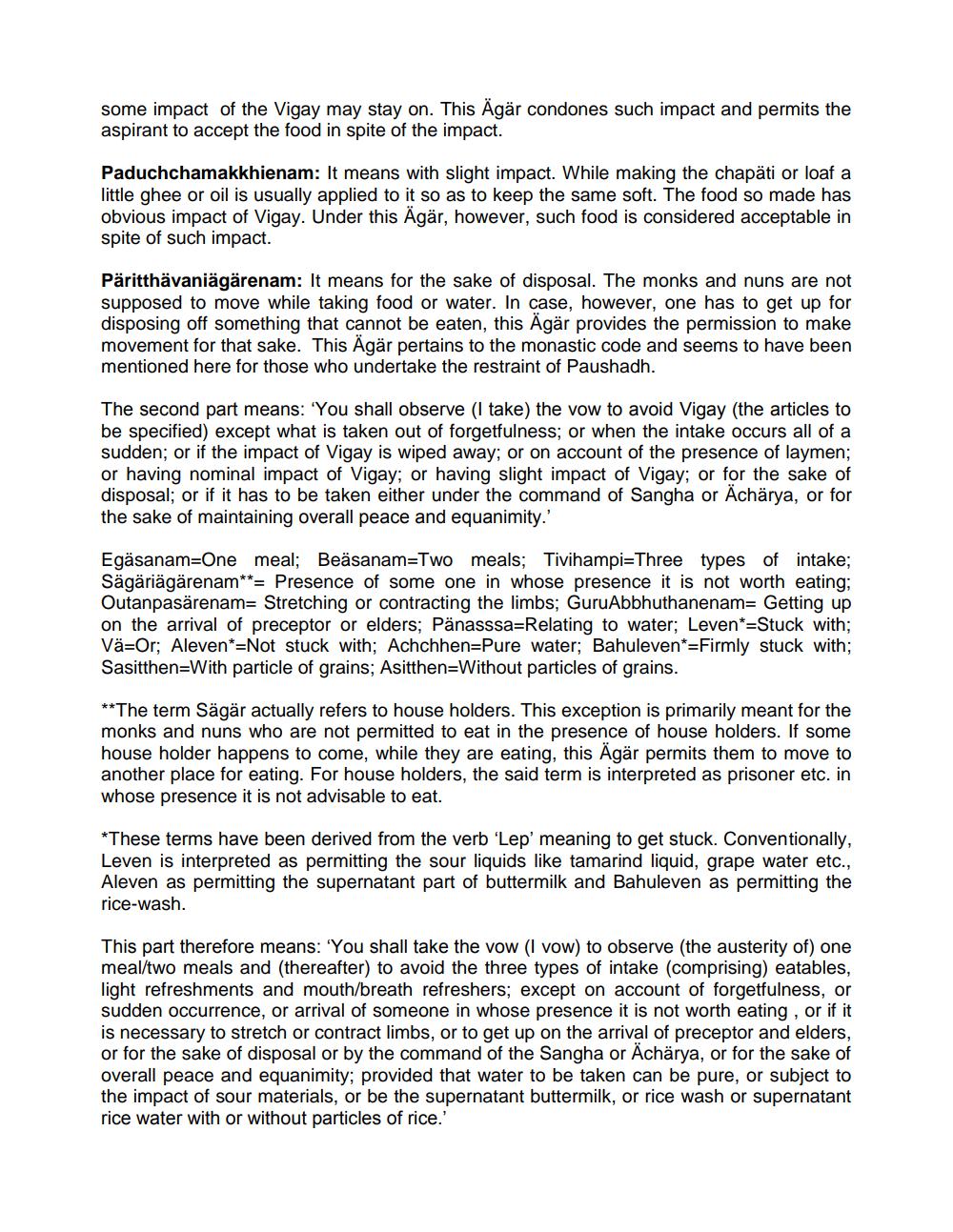________________
some impact of the Vigay may stay on. This Ägär condones such impact and permits the aspirant to accept the food in spite of the impact.
Paduchchamakkhienam: It means with slight impact. While making the chapati or loaf a little ghee or oil is usually applied to it so as to keep the same soft. The food so made has obvious impact of Vigay. Under this Ägär, however, such food is considered acceptable in spite of such impact.
Päritthävaniägärenam: It means for the sake of disposal. The monks and nuns are not supposed to move while taking food or water. In case, however, one has to get up for disposing off something that cannot be eaten, this Ägär provides the permission to make movement for that sake. This Ägär pertains to the monastic code and seems to have been mentioned here for those who undertake the restraint of Paushadh.
The second part means: 'You shall observe (I take) the vow to avoid Vigay (the articles to be specified) except what is taken out of forgetfulness; or when the intake occurs all of a sudden; or if the impact of Vigay is wiped away; or on account of the presence of laymen; or having nominal impact of Vigay; or having slight impact of Vigay; or for the sake of disposal; or if it has to be taken either under the command of Sangha or Acharya, or for the sake of maintaining overall peace and equanimity."
Egäsanam One meal; Beäsanam-Two meals; Tivihampi-Three types of intake; Sägäriägärenam**= Presence of some one in whose presence it is not worth eating; Outanpasărenam Stretching or contracting the limbs; GuruAbbhuthanenam Getting up on the arrival of preceptor or elders; Panasssa-Relating to water; Leven"-Stuck with; Vä=Or, Aleven"-Not stuck with; Achchhen-Pure water; Bahuleven"=Firmly stuck with; Sasitthen With particle of grains; Asitthen-Without particles of grains.
**The term Sägär actually refers to house holders. This exception is primarily meant for the monks and nuns who are not permitted to eat in the presence of house holders. If some house holder happens to come, while they are eating, this Ägär permits them to move to another place for eating. For house holders, the said term is interpreted as prisoner etc. in whose presence it is not advisable to eat.
*These terms have been derived from the verb 'Lep' meaning to get stuck. Conventionally, Leven is interpreted as permitting the sour liquids like tamarind liquid, grape water etc., Aleven as permitting the supernatant part of buttermilk and Bahuleven as permitting the rice-wash.
This part therefore means: 'You shall take the vow (I vow) to observe (the austerity of) one meal/two meals and (thereafter) to avoid the three types of intake (comprising) eatables, light refreshments and mouth/breath refreshers; except on account of forgetfulness, or sudden occurrence, or arrival of someone in whose presence it is not worth eating, or if it is necessary to stretch or contract limbs, or to get up on the arrival of preceptor and elders, or for the sake of disposal or by the command of the Sangha or Acharya, or for the sake of overall peace and equanimity; provided that water to be taken can be pure, or subject to the impact of sour materials, or be the supernatant buttermilk, or rice wash or supernatant rice water with or without particles of rice.'




